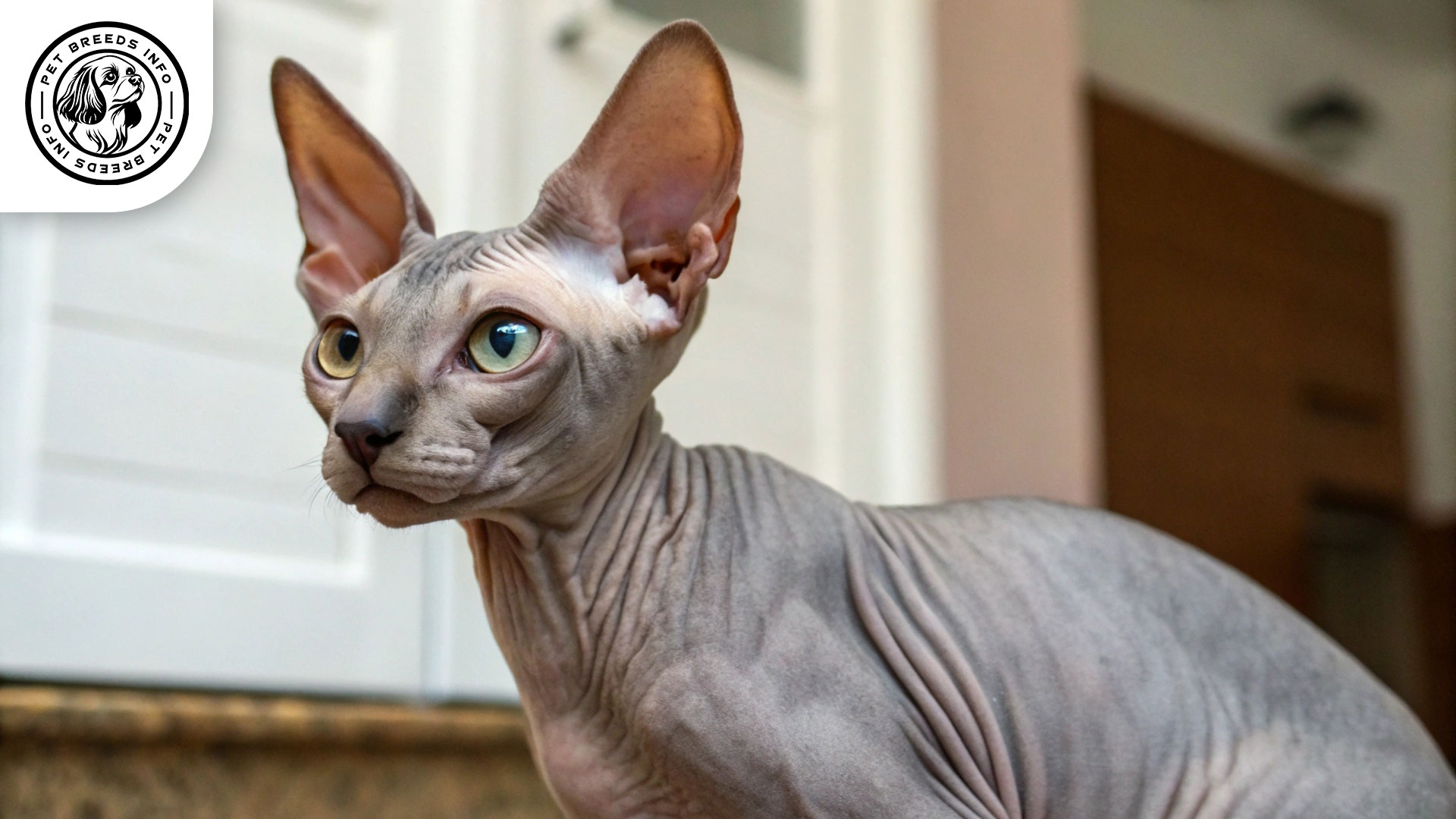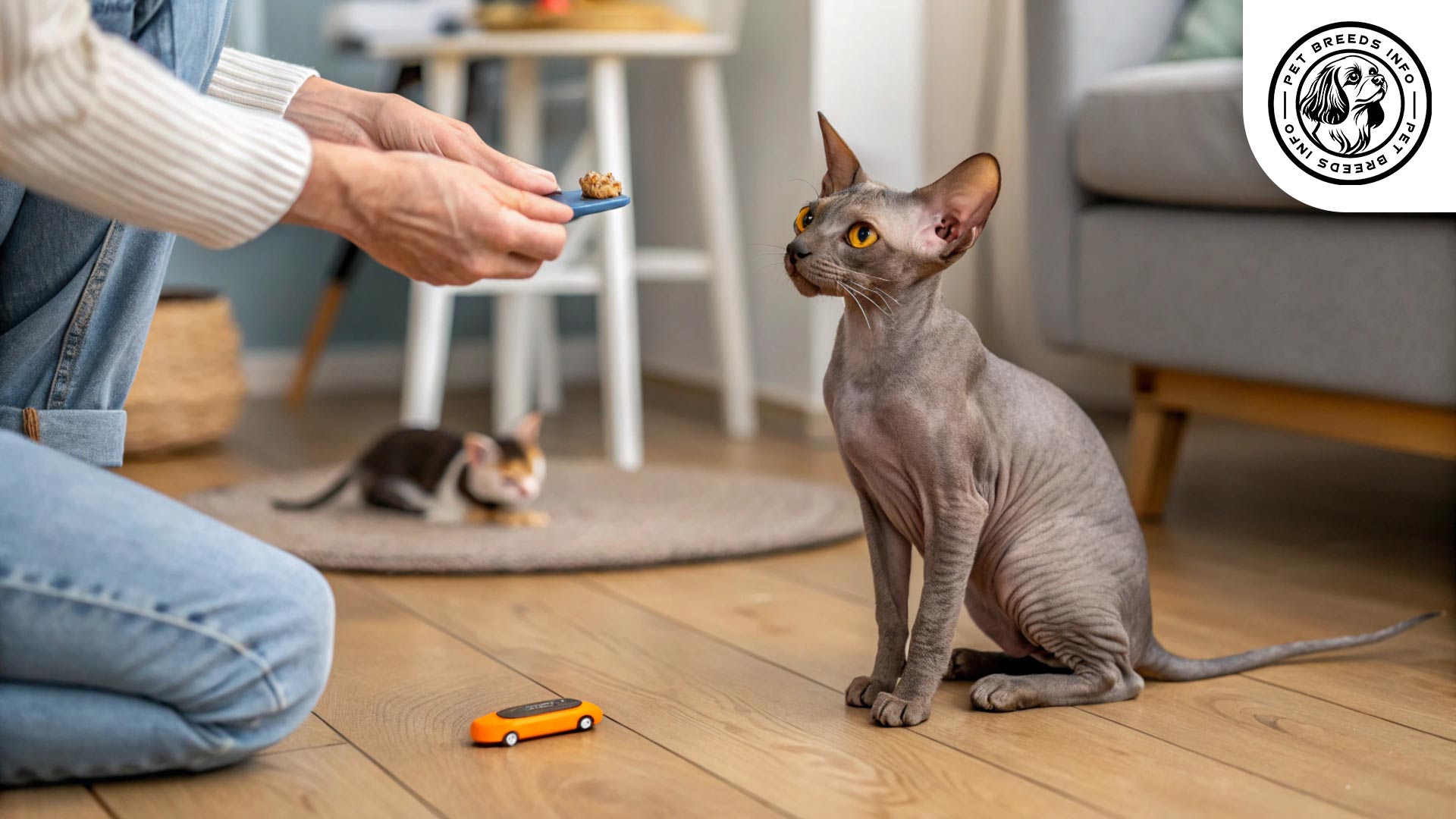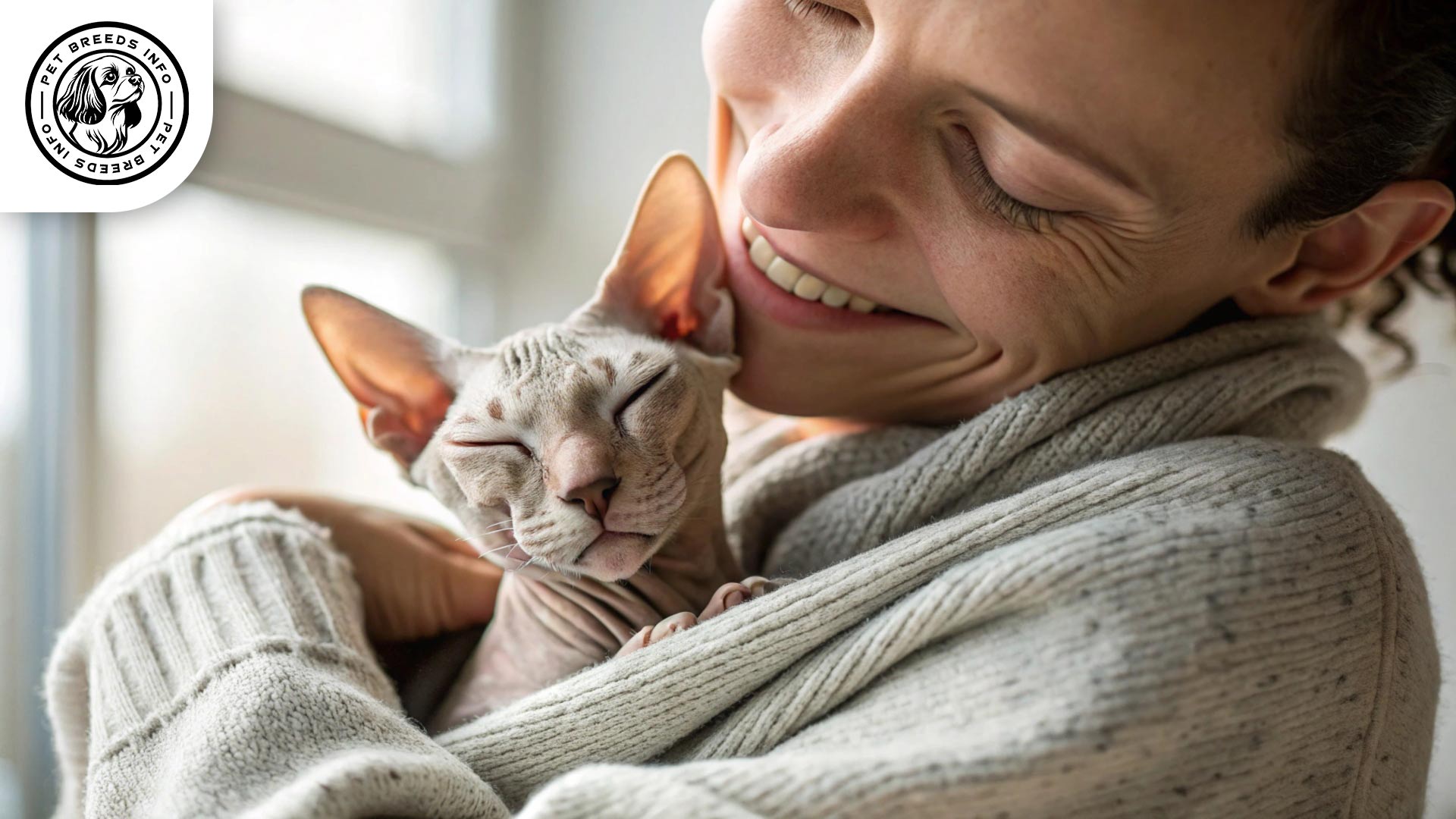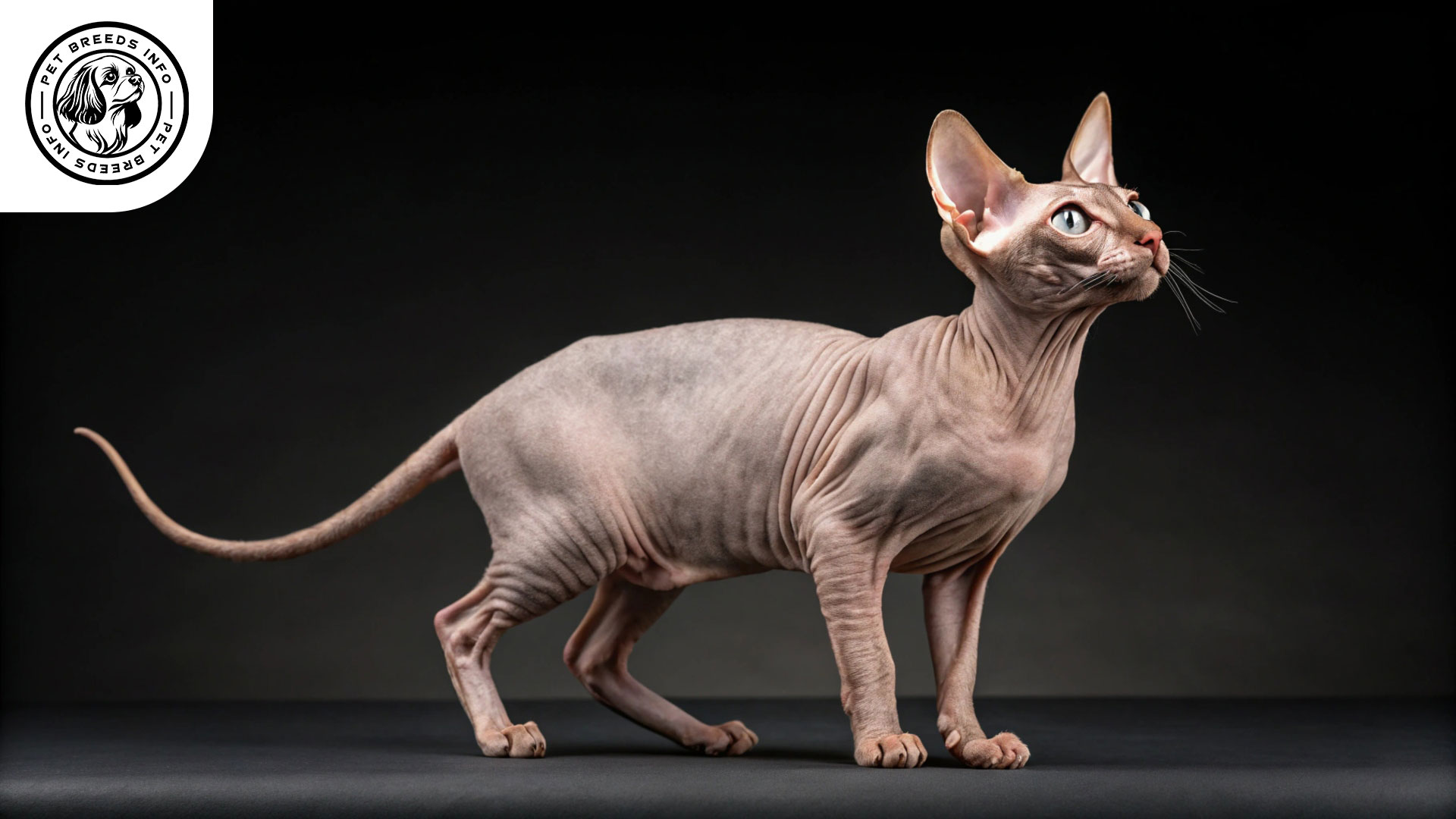Donskoy Cat Breed: Size, Health, Price & Personality
General Introduction of the Breed
The Donskoy cat, also known as the Don Sphynx, is a unique and striking breed originating from Russia, renowned for its hairless appearance and elegant, muscular body. Discovered in the late 1980s in Rostov-on-Don, this breed is characterized by its soft, warm skin, which often feels like suede to the touch, and its expressive, almond-shaped eyes that exude intelligence and curiosity. Unlike other hairless breeds, the Donskoy’s lack of fur is due to a dominant gene mutation, making it distinct from the Sphynx. These cats are highly social, affectionate, and playful, forming strong bonds with their owners and thriving in environments where they receive ample attention and interaction.
Donskoy cats are not only prized for their distinctive look but also for their warm, dog-like personalities, often following their owners around and enjoying cuddles. They are adaptable to various climates but require special care to protect their sensitive skin from sunburn and cold temperatures. With their energetic nature and love for play, Donskoys are ideal for families or individuals seeking a loyal and engaging feline companion. Their hypoallergenic qualities also make them a popular choice for those with allergies, though regular grooming is essential to maintain their skin’s health. This captivating breed continues to charm cat lovers worldwide with its unique beauty and loving temperament.
Donskoy cats are affectionate, social, and intelligent, with unique hairless beauty. They require specific care but are loyal, playful companions.Quick Overview
Affectionate - 90%
Independent - 60%
Intelligent - 85%
Sociable - 95%
Vocal - 70%
Shedding - 0%
Energetic - 80%
69%
100
| Weight | Males: 8-12 pounds (3.6-5.4 kg); Females: 6-10 pounds (2.7-4.5 kg) |
| Lifespan | 12-15 years |
| Color | Various colors and patterns, including solid, tabby, and tortoiseshell |
| Diet | High-protein diet, wet or high-quality dry food, raw diet option; avoid toxic foods like onions, chocolate, and dairy; 2-3 meals per day |
| Care | Weekly bathing, limited sun exposure, regular nail trimming, ear cleaning, dental care, warm environment, regular play sessions |
| Health | Prone to genetic skin conditions (dermatitis), dental issues; susceptible to temperature changes; routine vaccinations and vet check-ups essential |
| Nature | Intelligent, affectionate, social, playful, curious, friendly, adaptable, sensitive to environmental changes |
| Price | $500 – $2,000 (depending on lineage and breeder) |
Table of Contents
Physical Characteristics
Donskoy cats are medium-sized with muscular, well-proportioned bodies. Males typically weigh between 8-12 pounds, while females range from 6-10 pounds.
Their skin is soft, often described as suede-like, and comes in various colors and patterns, including solid, tabby, and tortoiseshell. Their eyes are almond-shaped and can be green, blue, or amber. They have large, wide-set ears, long toes, and characteristic wrinkles on their bodies, especially around the head and shoulders.
Personality and Temperament
The Donskoy cat breed is celebrated for its warm, affectionate, and highly social personality, making it a beloved companion for those seeking an interactive and loyal pet. These hairless felines are often described as dog-like in their devotion, frequently following their owners around the home, seeking attention, and enjoying close physical contact. Their playful and curious nature ensures they remain engaged with their surroundings, often entertaining themselves and their owners with their energetic antics. Donskoys thrive in environments where they can form strong emotional bonds, making them ideal for families, singles, or households with other pets, as they tend to get along well with others when properly socialized.

Beyond their affectionate demeanor, Donskoy cats are known for their intelligence and adaptability, quickly learning routines and even responding to basic training. Their expressive faces and inquisitive eyes reflect a keen awareness, and they often communicate their needs with gentle vocalizations or affectionate gestures. While their high energy levels make them fun and engaging, they also enjoy quiet moments of cuddling, especially in warm spots due to their lack of fur. This unique combination of playfulness, loyalty, and warmth makes the Donskoy an exceptional breed for those looking for a cat that’s both a lively companion and a loving friend.
Read More: Ojos Azules Cat
Care and Maintenance Requirements
As an active breed, Donskoys benefit from regular play sessions and interactive toys. They adapt well to apartment living but should have warm spaces, as they lack fur for insulation. Their skin requires special care, including weekly bathing to remove oils and prevent irritation. Sun exposure should be limited to avoid burns. Regular nail trimming, ear cleaning, and dental care are essential to maintain their health.
Diet and Nutrition
Donskoy cats require a high-protein diet to support their metabolism and active nature. Wet or high-quality dry cat food is recommended, with some owners preferring a raw diet. Avoid toxic foods such as onions, chocolate, and dairy. Portion sizes should be adapted to their age and activity level, with two to three meals per day.
Health and Common Medical Issues
The Donskoy cat, a hairless breed, generally enjoys good health but requires specific care due to its lack of fur, which makes it more susceptible to certain conditions. Their exposed skin is prone to sensitivity, requiring regular bathing to remove excess oils and prevent acne or skin infections. Donskoys are also sensitive to extreme temperatures, needing protection from cold environments and direct sunlight to avoid hypothermia or sunburn. Additionally, their lack of fur can lead to respiratory issues if exposed to drafts or allergens, so maintaining a clean, warm, and stable environment is crucial. Regular veterinary check-ups, a balanced diet, and proper grooming routines help ensure their overall well-being.
While Donskoys are not inherently prone to genetic disorders, some may develop dental issues, such as gingivitis, or heart conditions like hypertrophic cardiomyopathy, which can affect many cat breeds. Owners should monitor for signs of skin irritation, unusual lethargy, or respiratory distress and seek prompt veterinary care if noticed. Providing a nutrient-rich diet tailored to their high metabolism and ensuring regular dental cleanings can mitigate potential health concerns. With attentive care, Donskoys can live long, healthy lives, typically reaching 12-15 years, delighting owners with their vibrant energy and affectionate nature.
Read More: Havana Brown
Training and Behavior Management
Donskoy cats are intelligent and respond well to training. Positive reinforcement techniques, such as treats and praise, work best. Early socialization helps them become well-adjusted adults. They quickly learn household routines and can be taught commands, litter training, and even tricks.

Interaction with Other Animals and Humans
The Donskoy cat is renowned for its exceptional sociability, making it a delightful companion for both humans and other animals. This hairless breed thrives on interaction, often forming deep bonds with their owners through their affectionate and dog-like behavior. Donskoys are known to seek out attention, eagerly following their humans around the home, cuddling, and even engaging in playful antics to stay connected. Their warm, expressive nature and love for companionship make them an ideal choice for families, singles, or households seeking a cat that craves human interaction and enjoys being part of daily activities.
When it comes to other animals, Donskoys typically display a friendly and adaptable demeanor, especially when socialized early. They often coexist harmoniously with other cats, dogs, or pets, approaching them with curiosity and a playful spirit. Their non-aggressive temperament helps them integrate well into multi-pet households, though gradual introductions are recommended to ensure smooth relationships. Donskoys’ high energy and sociable nature make them excellent playmates, but their sensitivity to rough handling means interactions with very young children or boisterous pets should be supervised. With proper introductions and care, Donskoys shine as loving and engaging companions in diverse household settings.

Price and Availability
The price of a Donskoy kitten can range from $500 to $2,000, depending on lineage and breeder reputation. It is crucial to buy from a responsible breeder who tests for genetic health conditions. Adoption from rescue organizations or breed-specific shelters is also an option for those looking to provide a home to a Donskoy in need.
Conclusion and Final Thoughts
The Donskoy cat breed stands out as a captivating and affectionate companion, blending a unique hairless appearance with a warm, engaging personality that wins the hearts of cat lovers worldwide. Their playful, dog-like devotion, intelligence, and sociability make them an excellent choice for those seeking a loyal and interactive pet. While their care requires attention to their sensitive skin and temperature needs, the joy of their companionship far outweighs the effort, offering a rewarding experience for dedicated owners. Whether cuddling on the couch or playfully exploring their surroundings, Donskoys bring a distinctive charm to any home.
In conclusion, the Donskoy is more than just a striking appearance; it’s a breed that thrives on love, connection, and interaction, making it ideal for families, individuals, or multi-pet households. Their adaptability and hypoallergenic qualities further enhance their appeal, provided their specific care needs are met. For those ready to embrace the unique beauty and vibrant energy of the Donskoy, this breed promises a delightful and loving feline friend that leaves a lasting impression.
Read More: Kurilian Bobtail
FAQ
Are Donskoy cats truly hairless, and how do they differ from Sphynx cats?
Donskoys are typically hairless, though some may have a light “brush” coat. Their hairlessness stems from a dominant gene mutation, unlike the Sphynx’s recessive gene, making them genetically distinct.
What kind of care do Donskoy cats require for their skin?
Weekly baths with mild shampoo, limited sun exposure, and warm environments are crucial. Regular nail trimming, ear cleaning, and dental care are also needed.
What is the temperament of a Donskoy cat, and are they good with other pets and children?
Donskoy cats are known for their affectionate, social, and intelligent nature. They form strong bonds with their owners and enjoy the company of other pets and children. They are generally playful but not overly hyperactive.
What type of diet is recommended for Donskoy cats?
Donskoy cats require a high-protein diet to support their metabolism. This can include wet or high-quality dry cat food, and some owners opt for a raw diet. It’s important to avoid toxic foods like onions, chocolate, and dairy.
How much does a Donskoy kitten cost?
Prices range from $500-$2,000 based on breeder and lineage. Adoption from rescues is also an option.
